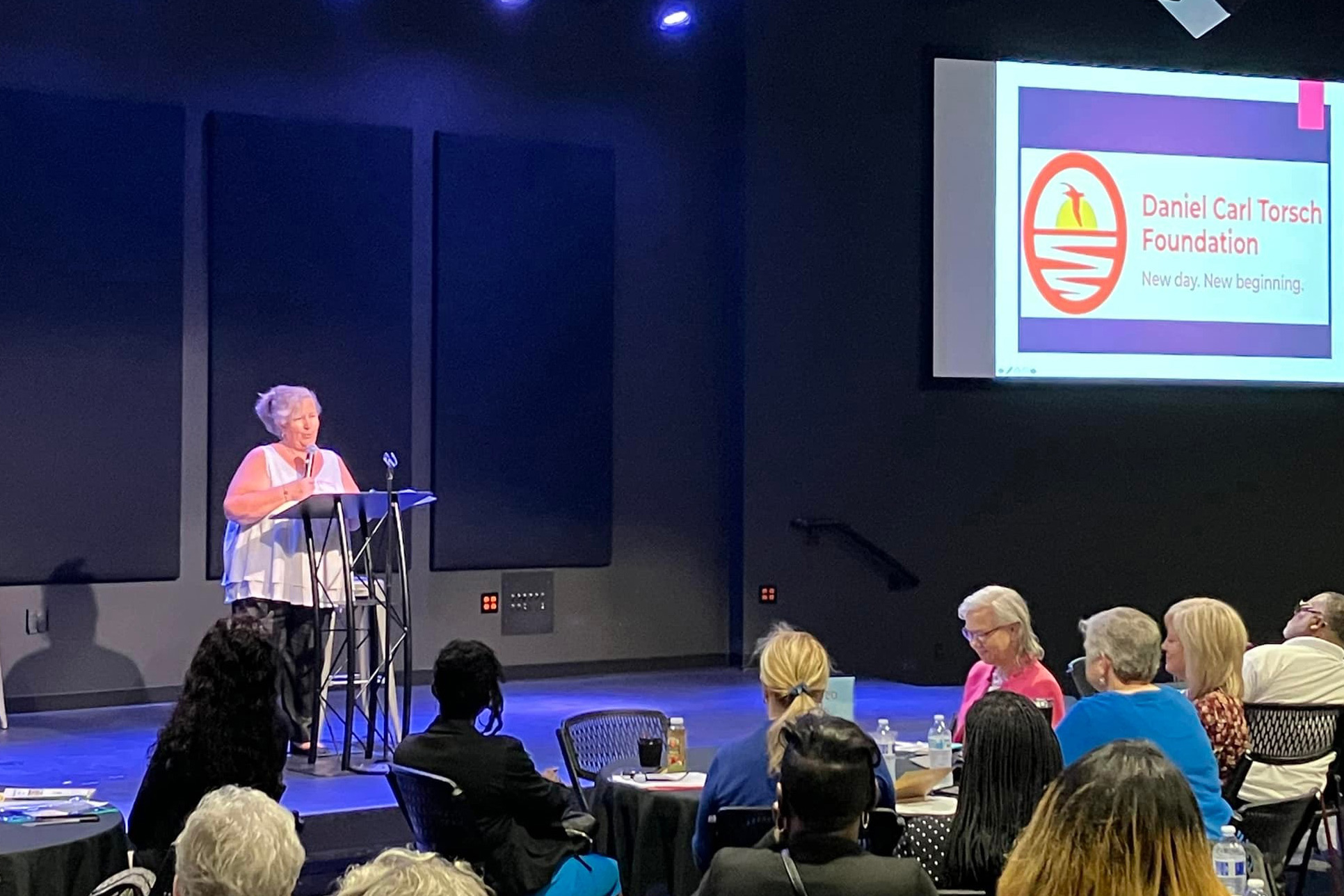After years of legal battles, state attorneys general won billions of dollars in opioid settlements from drug companies accused of fueling the addiction crisis. They declared victory at press conferences, and some touted the deals during their gubernatorial campaigns.
But now that the windfall is being spent, are attorneys general doing enough to ensure it’s used for the intended purposes?
No, say many families affected by the overdose crisis, recovery and harm reduction advocates, policy experts, and researchers following the cash.
“This is blood money,” said Toni Torsch, a Maryland resident whose son Dan died of an overdose at age 24. It can’t make up for the lives lost, but “we do want to make sure that it’s going to count.”
Torsch and others affected by the crisis are increasingly worried that no one seems to be guarding the opioid settlement cash while elected officials eye it hungrily. With the Trump administration slashing federal funding for addiction and Congress approving massive reductions to Medicaid — the largest payer for addiction care nationwide — people fear state legislators will use the settlements as a grab bag to fill budget shortfalls.
In the face of these concerns, two research and advocacy organizations are proposing a solution: a crowdsourced database to identify potential examples of misuse and prompt attorneys general to investigate.
The Opioid Policy Institute and Popular Democracy launched a website that allows members of the public to submit alleged cases of waste, fraud, abuse, and mismanagement of opioid settlement funds. Submissions are reviewed by Jonathan Stoltman, director of the Opioid Policy Institute, and then posted with details such as how much money was spent, what was purchased, who made the decision, and links to relevant news articles or budget documents.
The database, shared first with KFF Health News, includes about 150 examples to start, including $2,362 awarded by a Missouri county to its roads and bridge department and $375,600 spent on a body scanner for a Michigan county jail. The initial examples were sourced from people in recovery, advocates, and others Stoltman and his team asked to test the project. Stoltman acknowledged he’ll face criticism as the primary arbiter of what qualifies as misuse for the database, but said he’ll use research studies to defend his decisions.
The website also shows people how to file complaints with their state attorney general and ask the office to develop a formal process for receiving and investigating such complaints.
“I hope this is a wake-up call for state AGs that their work on this project is not done,” said Frank Kearl, who co-led the effort with Stoltman and is working as an attorney at Popular Democracy until July 14. “We still have time” to make changes to ensure we “spend this money in a way that actually responds to the harm that was caused.”
The website’s launch comes just over a week after New Jersey lawmakers passed a budget that gave health systems $45 million in settlement funds despite the state attorney general’s opposition. Legislators said it would shield hospitals from the blow of federal Medicaid cuts, but harm-reduction advocates said it gives short shrift to people with substance use disorders, whom the money was meant to serve.
Lawmakers in North Carolina and Washington, D.C., are also considering using settlement funds to plug gaps, and Connecticut and Nevada have discussed it too.
“That’s not what it’s there for,” said Torsch, who runs a nonprofit dedicated to addiction recovery in her son’s honor. “We want to make sure that money is being spent in the most responsible and effective way to help people that are still struggling.”

Last year, when Torsch heard that a western Maryland county spent some of its settlement money on guns, she reached out to her state attorney general to complain. The office said it wasn’t its responsibility, Torsch said, and told her to contact the health department.
She was confused.
The attorney general’s office is supposed to represent “the top cops,” Torsch told KFF Health News.
The Maryland attorney general’s office declined to answer KFF Health News’ questions about how it handles opioid settlement complaints.
About a dozen companies are expected to pay state and local governments more than $50 billion in opioid settlements over nearly two decades. Purdue Pharma’s case, the most well known, is still wending its way through court. But other companies, including Johnson & Johnson, CVS Health, and Walgreens, have begun paying.
Although the specifics of each settlement deal vary, most require states to use at least 85% of the money on efforts related to the opioid crisis. But enforcement is left to the companies that paid out the money. And legal experts are skeptical that the companies are monitoring state spending.
Attorneys general should be enforcing that standard too, said Stoltman, of the Opioid Policy Institute. “If you’re going to bang your chest about how much money you got for your state for opioids,” he said, “what are you doing to make sure that it’s actually being spent well?”
Stoltman’s and Kearl’s teams surveyed attorneys general offices in 56 states and territories to see if each office had a complaint form specific to this pot of money, explained the details needed to report misuse, and allowed submitters to track their complaints. They also searched websites of state auditors, comptrollers, and similar entities for complaint forms or procedures.

Their findings? Only three states mentioned specific processes for reporting misuse of opioid settlement money.
South Carolina and New Jersey had links on settlement-related websites that directed people to general complaint forms. Oklahoma was the only state to have an opioid settlement-specific form.
Jill Nichols, opioid response and grant coordinator in the Oklahoma Office of Attorney General, said it was created in April in response to the researchers’ inquiry. As of late June, she’d received one complaint, which was found to be without merit.
Stoltman and Kearl said they hope the crowdsourced database will encourage more attorneys general to take an active oversight role by illustrating how much potential misuse is occurring.
The Michigan attorney general’s office said it plans to publish a settlement-specific complaint form this year.
But some attorneys general told KFF Health News it wasn’t their job to track how the money is spent.
Brett Hambright, a spokesperson for Pennsylvania Attorney General David Sunday, said the state created an opioid settlement council to take on that responsibility.
In North Carolina, Attorney General Jeff Jackson’s office said, settlement funds are controlled by the state legislature and local governments. “Our office does not administer the funds nor do we have the power to withhold them,” spokesperson Ben Conroy said.
Even when attorneys general watch the money closely, their power may be limited. For example, Arizona Attorney General Kris Mayes went to court last year to stop the state legislature from giving $115 million in settlement funds to the Department of Corrections. But a judge ruled against her.
Maryland Attorney General Anthony Brown’s office directed KFF Health News’ questions to other state agencies.
Michael Coury, a spokesperson for Maryland’s Office of Overdose Response, said members of the public can email the office with complaints. If the office agrees misuse has occurred, it will bring the complaint to the attorney general, who — per the state’s agreement with local governments — “may” take action.
As of this year, the attorney general’s office will receive $1.5 million of Maryland’s opioid settlement funds annually to cover personnel and administration costs related to opioid-related lawsuits. This may involve suing more companies for future settlement deals.
Torsch, the Maryland mom, said she wishes the focus wasn’t just on winning more money but also ensuring that existing settlement dollars are spent well.
“We owe it to all the families that have been destroyed and suffered great losses,” she said.
KFF Health News is a national newsroom that produces in-depth journalism about health issues and is one of the core operating programs at KFF—an independent source of health policy research, polling, and journalism. Learn more about KFF.
USE OUR CONTENT
This story can be republished for free (details).






